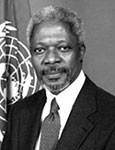
UNITED NATIONS (FinalCall.com)–Secretary-General Kofi Annan appointed five individuals June 16 to work along with the UN High Commissioner on Human Rights on the implementation of the “Declaration and Program of Action” of the 2001 World Conference Against Racism (WCAR), which was held in Durban, South Africa.
Referring to the appointees as “eminent experts,” Mr. Annan said they “have a wealth of experience and a commitment to anti-discrimination and equality issues, as well as an international profile that will contribute to the implementation of the Program of Action.”
The appointees are Dr. Edna Santos Roland, a psychologist and president of the board of directors of the Fala Preta Organization of Black Women of Brazil, who also served as the rapporteur-general at the WCAR; Prince El Hassan bin Talal of Jordan, founding member of an inter-religious and inter-cultural dialogue group based in Geneva, Switzerland; Marti Attisaari, the former president of Finland and chairman of the International crisis Group; Hana Suchocka, a former prime minister of Poland; and Salim Ahmed Salim of Tanzania, the former head of the Organization of African Unity (OAU).
“We never tell how such choices are made,” a spokesperson for Mr. Annan said, responding to a Final Call question regarding why no one from America’s African Diaspora was chosen to serve on the experts committee. “But you can see that the five do represent the five regional groupings of the United Nations,” the spokesperson said. “And Ms. Roland, being a Brazilian Black, surely represents the issue of the trans-Atlantic slave trade, and, of course, Mr. Salim represents the concerns of the African continent.”
“This does not stop our forward motion,” commented Dr. Conrad Worrill, chairman of the National United Black Front, during a telephone interview with The Final Call from his Chicago office. “When Mr. Kofi Annan does something like this, it merely means that there are greater challenges for the grassroots to organize around the issue of reparations.”
Mr. Annan’s spokesperson referred all questions concerning the experts’ agenda to the High Commissioner’s headquarters in Geneva. The Geneva office had not returned calls at Final Call press time.
“Obviously, Kofi Annan does not have the Durban Declaration on his radar screen, because if he did, he would not have made these appointments,” Dr. Worrill observed.
Paragraphs 165 and 166 of the Plan of Action talk about the right to seek from “competent national tribunals and other national institutions adequate reparation” and urges states to adopt necessary measures, as “provided by national law, to ensure the right of victims to seek just and adequate reparations and satisfaction to redress acts of racism, racial discrimination, xenophobia and related intolerance.”
Dr. Worrill said the secretary-general would have an opportunity to see that there has been significant mobilization around the issue of reparations on September 13, 2003, when activists stage their Pan-African Day demonstration in front of the UN.
“We are going to the UN to lobby the heads of state that will be appearing at the General Assembly,” he added.
Noting the forward motion of the reparations movement, Salih Booker, executive director of the Washington-based Africa Action, points to the U.S. legal cases that have been filed against corporations that have benefited from the American institution of slavery.
“Lawsuits will soon target the culpability of the government of the U.S. for sanctioning this crime against humanity,” Mr. Booker said.
He added that South Africans were pursuing similar legal action in U.S. courts against corporations that provided economic support to the apartheid regime in South Africa.
On June 16, a story appeared in the Toronto Star concerning the $21.7 billion Haitian officials say is owed by France for reparations. A foreign media liaison for the administration of Haitian President Bertrand Aristede said, “It’s not something Haiti came up with by itself. It came up in the context of the summit on race in South Africa.
“The French leadership has acknowledged that slavery was a crime against humanity,” the Haitian official added.
In the meantime, other analysts say that Blacks in America need to know that the link between slavery and their lives in 2003 is much closer then they think.
“The lie that slavery ended 138 years ago is being used by opponents of reparations to block the movement,” said Ron Walters, director of the African American Leadership Institute and professor of government and politics at the University of Maryland-College Park.
He said that he and others had researched documents from the Department of Justice, which state that Blacks were enslaved as late as 1950, and possibly up until 1960, through things such as Alabama’s convict-lease program.
“Under this system, the sheriffs would charge a Black person with a crime, lock him up, then lease him out to the nearest plantation owner,” Mr. Walters said.












